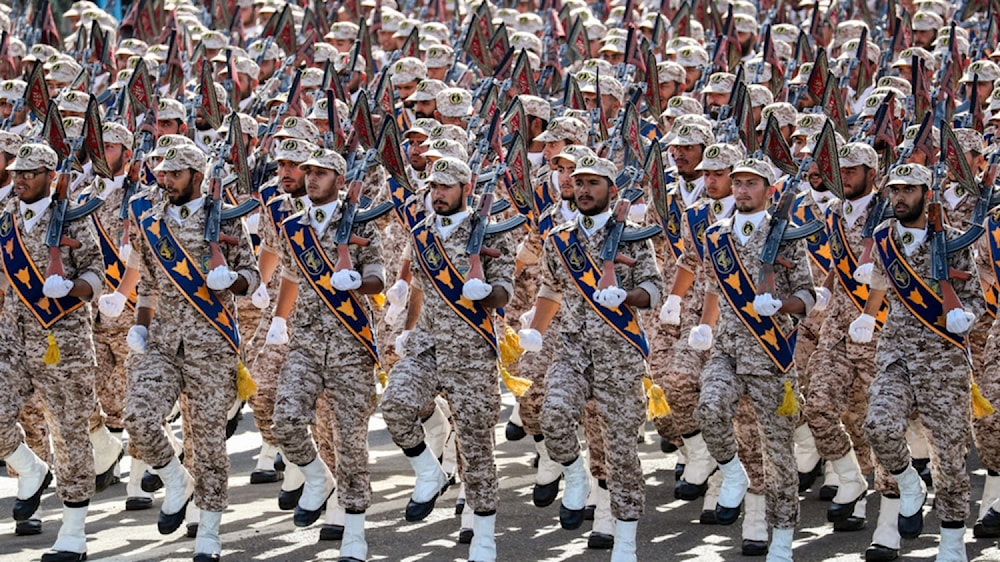Labour unlikely to designate IRGC, seeks 'proscription-style' limits
The Guardian says the UK's new foreign secretary will seek advice from colleagues on the implications for Iranian foreign policy following the election of Masoud Pezeshkian as president.
-

Members of Iran's Islamic Revolution Guards Corps (IRGC) during a parade (AFP)
The Labour Party in the United Kingdom is unlikely to hastily designate Iran's Islamic Revolution Guards Corps (IRGC) as a "terrorist organization", opting instead to consider the creation of a new category for "state-sponsored terrorism," The Guardian reported on Monday.
The news website added that the UK's new foreign secretary, David Lammy, will also seek advice from colleagues on the implications for Iranian foreign policy following the election of reformist candidate Masoud Pezeshkian as Iran's new president.
Previously, while in opposition, Labour had proposed designating the IRGC as a "terrorist organization", with Tehran cautioning that such a move could severely damage UK-Iranian relations.
The designation of the IRGC would set a significant precedent for the UK to label a segment of another state over alleged "acts of terrorism".
"We recognise there are real challenges from state-sponsored terrorist activity, and I want to look closely at those issues, and how the predecessor system works for states, as well as for specific terrorist organisations," Lammy told The Guardian.
The Foreign Secretary's aides indicate he is considering an amendment to existing laws to enable the UK government to impose "proscription-style" restrictions on state-linked entities like the IRGC, the news website revealed.
However, this could take time to develop, and the Labour manifesto mentioned a potential new framework for "state-sponsored terrorism" without specifically naming the IRGC.
The Guardian recalled that David Cameron, Lammy’s predecessor as foreign secretary, resisted extensive parliamentary pressure to designate the IRGC, arguing it could lead to Tehran severing diplomatic ties with London.
Regarding Pezeshkian's election, Lammy told the news website, "I’ve seen the development over the last 24 hours. I want to speak to other colleagues about that and what that really means on the ground, I think it’s a little bit early to say."
This comes after Iran's president-elect Masoud Pezeshkian sent the leader of the Islamic Resistance in Lebanon, Sayyed Hassan Nasrallah, a message asserting the Islamic Republic's support for the Resistance and the people of the region against the illegitimate Israeli occupation.
Pezeshkian also informed Russian President Vladimir Putin of Tehran's readiness to finalize a delayed comprehensive cooperation agreement with Moscow.
The Guardian highlighted that, in a paper last year, Jonathan Hall, the UK’s terrorism law advisor, suggested that designating the IRGC would mean acknowledging, contrary to longstanding UK policy, that state forces and thereby states can be allegedly "concerned in terrorism" under the Terrorism Act 2000.
Hall proposed that the 2000 law might need amending to legitimize the use of force by states in accordance with humanitarian law.
It is noteworthy that the Canadian government labeled in June the IRGC as "a terrorist entity under the Criminal Code."
"This action sends a strong message that Canada will use all of the tools at its disposal to combat the terrorist entity of the IRGC," Public Safety Minister Dominic LeBlanc said at the time.
Following the designation, according to LeBlanc, thousands of top Iranian government officials, including IRGC members, will be barred from entering Canada, and current and former officials living in the nation might face inquiry and deportation.
Read more: Iran slams Canada blacklisting IRGC, reserves right to respond

 3 Min Read
3 Min Read








